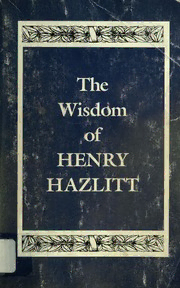
The Wisdom PDF
Preview The Wisdom
The Wisdom HENRY HAZLlW SEPROHIBE an co«3 o^^.««- ; , ,', wAtoa The Wisdom of Henry Hazlitt The Foundation for Economic Education, Inc. Irvington-on-Hudson, New York 10533 045442 Published March 1993 ISBN 910614-83-0 Q^pyright C by The Foundation forEconomicEducation, Inc. . 1 TABLE OF CONTENTS INTRODUCTION -3 HansF. Scnnholz TRIBUTES 1. AManforManySeasons 1 BettinaBienGreaves • 2. ATruePolymath 32 EdmundA. Opitz • 3. IndefatigableLeader 35 LudwigvonMises HAZLITTRESPONSES s 4. Reflectionsat70 39 , 5. TheArtofThinking 49 OFTHEMARKETORDER 6. TheABCofaMarketEconomy 75 7. PrivateOwnership: AMust 82 8. Rights 89 9. TheCasefortheMinimalState 98 10. TheSphereofGovernment: Nineteenth-Century Theories 109 11. HowShouldPricesBeDetermined? 122 12. MarketPricesvs. CommunistCommands 132 13. TheDistributionofIncome 137 THEROADNOTTAKEN 14. TheRoadNotTaken 155 15 TheTorrentofLaws 164 16. FromSpencer's 1884toOrwell's 1984 174 17. "Planning"vs. theFreeMarket 183 18. PrivateProperty,PublicPurpose 193 19. KeynesianisminaNutshell 208 m iv / INTRODUCTION Introduction It was in 1954 that I first met Henry Hazlitt. I was a young instructor at lona College in New Rochelle, New York, lecturing on theprinciplesofeconomicsandconductingaseminarinGermancon- versation.InbothmyassignmentsIreliedheavilyonFEEpublications whichIdistributedinlargequantitiestomystudents,suchasClipping ofNoteandsmallpamphletscalled/«Brief.Inmylanguagecolloquium I spoke ofGerman philosophers and economists and frequently re- ferred to Ludwig von Mises' Omnipotent Government, which FEE made available at bargain prices. When, upon Leonard Read's invita- tion, I attendedthe fall Boardmeeting andreported aboutmyuse of FEE material, Henry Hazlitt questioned me with great interest and insight. He was a seniormemberofthe Boardhavingparticipated in the very inception ofFEE. In the world ofthe written word he was the renowned associate ofNewsweek and the columnist of"Business Tides." I watched with awe and admiration how Henry Hazlitt, in the years that followed, never failed to fmd eloquent words and lucid composition to dwell upon economic subjects. He, more than any otherEnglish writerI knew, wrote as the commonpeople speak, but thought as wise men do. Proper writing, to Mr. Hazlitt, was but a differentnameforlucidconversation.Hisguidewastruthwhichmade him write powerfully, naturally, andconvincingly. Hewrote until he was four-score-and-ten because he liked to write and liked himself betterwhenhedid. Thespokenwordsoonperishes;thewrittenwordremains;itmay survive for many decades or even centuries. Henry Hazlitt's writing may point the way for generations to come. Ofall that he wrote, he wrote mostcandidlyandforcefullyforTheFreeman. Afterall, hewas instrumentalinthe rebirthofthejournalafterWorldWarII. Hehad read it with great interest ever since it made its first appearance in 1920,editedbyAlbertJayNock,thegreatlibertarianjournalist.Ithad folded,asmostnewperiodicalsdo,afewyearslater;re-emergedunder theeditorshipofSuzanneLaFollettein 1929,andperishedagaindur- 4 / The WisdomofHenryHazlitt ing the Great Depression in 1931; reappeared in 1938 and folded again during World War II. In 1950, Henr\' Hazlitt together v\ith SuzanneLaFollette andJohnChamberlainre\ivedTheFnenum again like the Phoenix ofEgv^ptian m\tholog\', lifting it rene^^'ed from the ashestostartanotherlonglife.Whenitagainranintoeconomicturbu- lence, theysteered ittoLeonard Read's Foundation uliich became its soleownerin 1954anditspublisherin 1956.WithFEEastheperma- nentbase. TheFreemanwastosoartonewheights. Henry Hazlitt's name is fore\'ercarved in the annals ofTheFret- man. He served it as co-editor and then editor-in-chieffrom 1950 to 1954; when it joined the Foundation, he became its most illustrious andindustriouscontributor. Hepennedsixt)'majoressa^-sandarticles aswellasdozensofbookre\'iews. Allalong, hewroteimmortalbooks whicharethefull-length mirrorsofhisactivemind. He was still an editorial v^-riter for the New Tark Times when he wrote his most popular and influential book,Economiain OneIxssan. Since its firstprinting in 1946 itsold morethancmc million copies in numerouseditionsandcontinuestosell at a rateofsoeralthousanda year. It is probably the best "little book** on the fallacies ofpopular economicnotions and policiese\erwritten. One source ofthe numerous fallacies which haunt ccontxnics, ac- cordingto Hazlitt, is the endless pleadingsofself-interest. Everv-eco- nomicgroup has interests which are antagtmistic to tfKweofall other groups. Many of these groups argue plausibly and persistenth' for special policies which benefit them at the expenseofallothergroups. Theyeitherconvince the public that the special policies are sound, or sobefuddle itthatconfusion pre\aiLs. Another source ofthe countless fallacies which plague economics more than any other field ofknowledge is the persistent rendenc>' to see only the immediate, short-run etVects of a polia- and ignore its long-run effects. Hcnr\' Hazlitt was convinced that this inclination is animportantdifference bervscen gcxxleconcxnics and bad. Economics in OneLesson cxpkxies both fallacies. From automation and unemploNTnent to rent contn)l and price fixing, it confronts and refutes them all. Ba.sed on classical economic pnnciples, the bookwas hailed around the world as the best "lesson" in economics for an>'one whoseekstruthfulanswerstotheburningeconomicissuesofourtime. Despite the popularity' ofEamomta in One Lesson the search for
